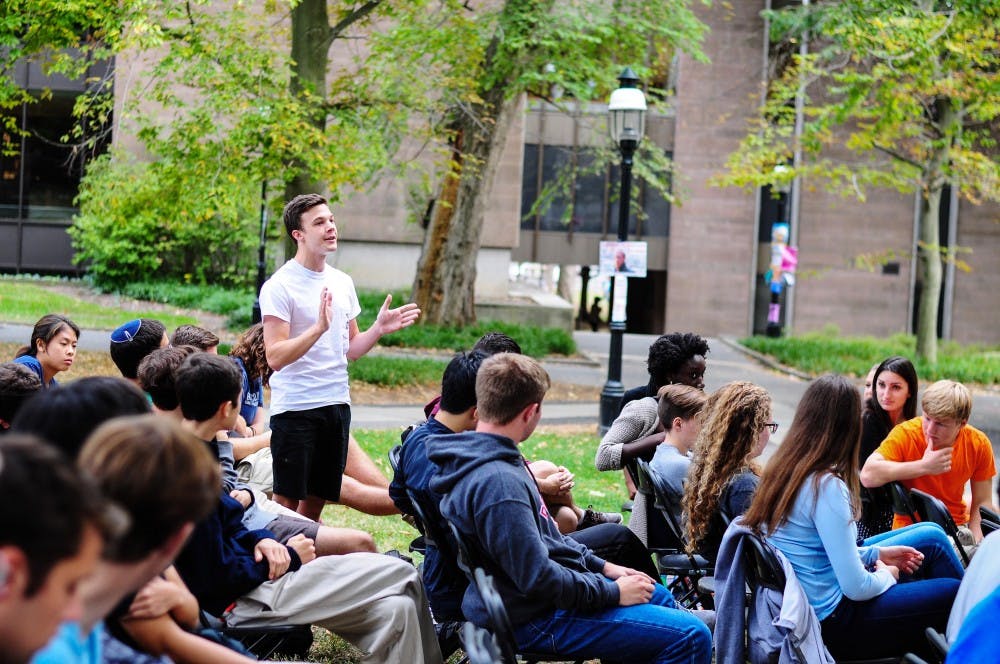The first Whig-Cliosophic Senate Debate of the year took place on Monday, with candidates from the opposing sides debating whether the Republican presidential field will produce a better candidate than the Democratic presidential field.
The Clio, or conservative, side won the debate by a vote of 15 to 13.
The debate opened with arguments from Allison Berger ’18, representing Clio, and Ethan Marcus ’18, representing Whig. Berger said that the Republicans are better both on policy and politics. On the policy side, she noted that the Democratic side supports Obamacare, which will cause health insurance rates to continue to rise, and the Iran nuclear arms deal, which gives Iran support to develop nuclear weapons that could be used against Americans.
“In short, the Democratic field is advocating continuation of the disastrous policies of the Obama administration’s failed progressive experiment,” she said.
On the political side, she noted that the Republicans are favored to win because Democrats have faced tremendous losses in both houses of Congress and in key battleground states, and that most political parties do not win three elections in a row.
Marcus said that it was ridiculous to assume that Republicans could beat even the lower-polling Democratic candidates, let alone former Secretary of State Hillary Clinton or U.S. Senator for Vermont Bernie Sanders, and went on to point out the flaws with specific Republican candidates. He pointed to former governor Jeb Bush’s flip-flopping on issues such as immigration and the fact that Hewlett-Packard lost over half its value while Carly Fiorina was its CEO.
He also said that Democrats are more willing to reach across the aisle and compromise.
The floor was then opened for discussion from the audience. Peter Russell ’19, the first speaker, said that the Republican candidates have no actual record besides yelling at people and shaking them down.
“Ted Cruz, class of ’92, can stand up and talk about things,” he said, “but he’s not really a believer in America. He’s a believer in Ted Cruz.”
One of the themes of the discussion was the diversity of viewpoints in both parties, with Evan Draim ’16 pointing out that the Republicans have a much wider diversity of candidates than the Democrats and that while the Republicans have already had two nationally televised debates, allowing candidates to discuss issues and hone their viewpoints, the Democrats have had none.
Ryan Spaude ’16 further noted that the Democratic candidates are all white and elderly, unlike the Republicans.
Closing arguments were then made by Matt Chuckran ’17 for Whig and Theodore Furchtgott ’18 for Clio.
Chuckran said that the Democratic candidates are more diverse despite their being fewer in number, while the Republican candidates all say the time thing, with the exception of Trump. He described Hillary Clinton as another President Barack Obama, Vice President Joe Biden as another President Bill Clinton but with fewer scandals, and Sanders as someone who seems extreme but whose policies are not particularly extreme.
He said that what the nation needs is someone to advocate for the “silent majority,” and that this goal will be accomplished even if Sanders does not win the primary because he will still push Hillary Clinton left.
Furchtgott said he agreed with Chuckran that Clinton would be another Obama, but added that he does not think another Obama is what the country needs. The Democrats, he said, are inherently regressive, noting that the Dodd-Frank Act makes it hard for young people to get mortgages and the Democrats’ support of teachers’ unions benefits wealthy parents who send their children to private schools rather than poor public school districts.
The debate took place at 4:30 p.m. on the lawn by Whig Hall.







